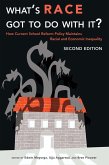The Wire is widely considered to be the blueprint of a post-racial TV show. It features more Black characters than any other US TV show has ever done before. African Americans are depicted in all possible positions of social and professional hierarchies. However, the show maintains some of the stereotypical depictions of African Americans that have been prevalent throughout the history of film and television as well as the history of the US. With a close look on the history of Black representation in the United States and the stereotypes used in 20th century film and television, Eike Rüdebusch analyzes The Wire with regard to social as well as media stereotypes of African Americans. Thereby he shows the changes in African American representation on The Wire, but also that The Wire is not deserving of such idealistic post-race praises.
Bitte wählen Sie Ihr Anliegen aus.
Rechnungen
Retourenschein anfordern
Bestellstatus
Storno








